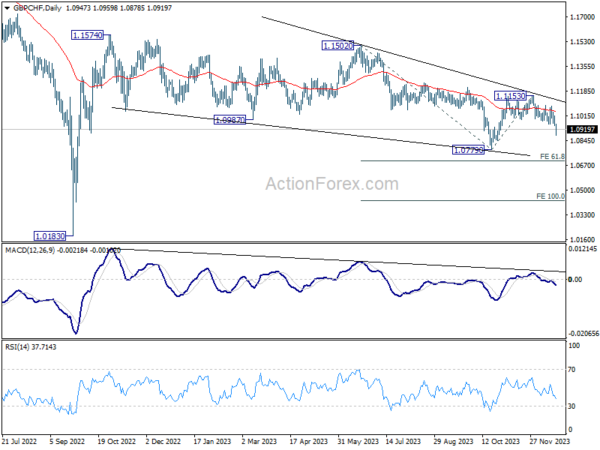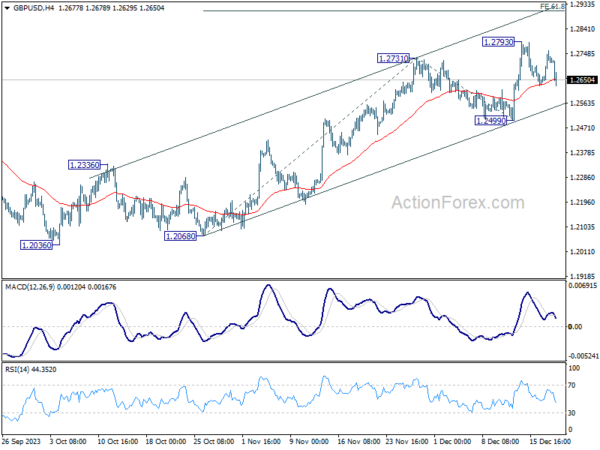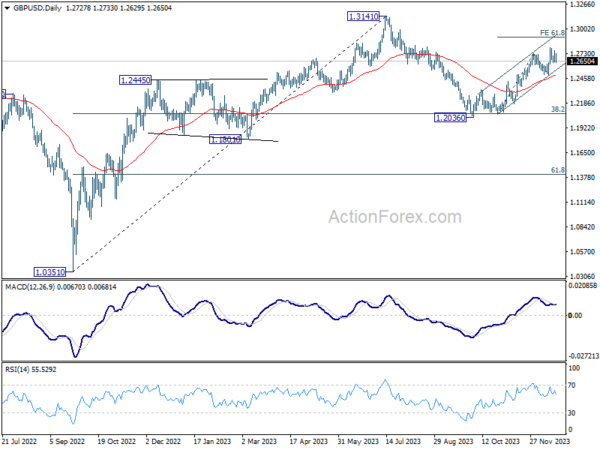Sterling faced a broad decline today following release of UK CPI data, which indicated that inflation slowed more significantly than anticipated. This unexpected deceleration in inflation has led markets and economists to quickly adjust their expectations for BoE rate cut. The markets are now fully pricing the first 25bps reduction as early as May, with projections suggesting interest rates could drop to 4% or lower by the end of 2024. Notably, Goldman Sachs has also moved forward its forecast for BoE’s interest-rate cut from June to May.
In the broader currency market, Swiss Franc and Euro are trailing behind Sterling as the next weakest currencies. Euro’s decline is partly attributed to a deeper than expected drop in Germany’s PPI in November, signaling potential economic softness in the Eurozone’s largest economy. Conversely, Japanese Yen is making a comeback, recovering from its post-BoJ selloff and currently emerging as the strongest performer of the day. New Zealand Dollar and Australian Dollar are also showing firmer positions. Meanwhile, US Dollar’s recovery appears to be limited to its performance against European currencies for the time being.
Technically, with today’s downside acceleration, GBP/CHF’s fall from 1.1153 is more likely resuming the larger down trend from 1.1574. Risk will stay on the downside as long as 55 D EMA (now at 1.1046) holds even in case of recovery. Deeper fall is in expected through 1.0779 support to 61.8% projection of 1.1502 to 1.0779 from 1.1153 at 1.0706 next.
In Europe, at the time of writing, FTSE is up 0.62%. DAX is down -0.03%. CAC is up 0.08%. Germany 10-year yield is down -0.55 at 1.968, back below 2% handle. UK 10-year yield is down -0.118 at 3.540. Earlier in Asia, Nikkei rose 1.37%. Hong Kong HSI rose 0.66%. China Shanghai SSE fell -1.03%. Singapore Strait Times fell -0.28%. Japan 10-year JGB yield fell -0.0708 to 0.563.
Bundesbank’s Nagel cautions against premature ECB rate cut expectations
Bundesbank President Joachim Nagel has issued a warning to investors and analysts anticipating an early interest rate cut by ECB.
In an interview, Nagel emphasized the importance of maintaining the current interest rate levels to ensure the effective management of inflation. “We must initially remain at the current interest rate plateau so that monetary policy can fully develop its inflation-dampening effect,” he stated.
Nagel’s cautionary words to those speculating on an imminent rate cut were stark: “Be careful, some people have already miscalculated that.” However, Nagel did acknowledge that interest rates have likely reached their peak, suggesting that while an immediate rate reduction may not be on the horizon, the period of aggressive rate hikes should have come to an end.
UK CPI slows to 3.9% yoy in Nov, core CPI down to 5.1% yoy
UK CPI slowed from 4.6% yoy to 3.9% yoy in November, below expectation of 4.3% yoy. Core CPI (excluding energy, food, alcohol and tobacco) slowed from 5.7% yoy to 5.1% yoy, below expectation of 5.5% yoy. CPI goods fell from 2.9% yoy to 2.0% yoy. CPI services also fell from 6.6% yoy to 6.2% yoy.
ONS noted, “The easing in the annual inflation rates reflected downward contributions from eight divisions, most notably transport, recreation and culture, and food and non-alcoholic beverages. There were no divisions with large offsetting upward effects.”
On a monthly basis, CPI was down -0.2% mom, below expectation of 0.2% mom rise.
Germany’s Gfk consumer climate rises to -25.1, consumers still have major worries
Germany’s Gfk Consumer Climate for January rose from -27.6 to -25.1. In December, income expectations rose from -16.7 to -6.9. Willingness to buy rose from -15.0 to -8.8. Willingness to save rose from 5.3 to 7.3.
“It remains to be seen whether the current increase represents the start of a sustained recovery in consumer sentiment,” explains Rolf Bürkl, consumer expert at NIM.
“Consumers still have major worries. Geopolitical crises and wars, sharply rising food prices and discussions around national budget for 2024 continue to cause uncertainty. As a result, the level of consumer sentiment is currently still very low.”
Japan’s divergent export trend: 26 months of US growth, 12 months of China decline
Japan’s trade statistics for November were marked by a slight decline in exports and a more significant drop in imports. Exports fell marginally by -0.2% yoy, totaling JPY 8829B, marking the first drop in three months.
A closer look at export destinations shows contrasting trends. Exports to US continued to grow, marking a 5.3% increase and extending the expansion streak to 26 months. In contrast, exports to China fell by -2.2%, continuing a downward trend for the 12th consecutive month. One of the most notable declines was in food shipments, which plummeted by -60.3%, significantly impacted by China’s ban on Japanese seafood imports.
On the import side, Japan saw a more pronounced decline of -11.9% yoy, with total imports amounting to JPY 9597B. This reduction in imports contributed to a trade deficit of JPY -777B for the month.
When adjusted for seasonal variations, exports dropped by -1.8% mom to JPY 8567B, and imports decreased by -2.7% mom to JPY 8976B. Consequently, trade deficit narrowed from JPY -501B to JPY -409B.
Australia’s Westpac leading index climbs to 0.3%, signaling stabilization, not an upturn
Westpac Leading Index in Australia showed an encouraging rise from -0.39% to 0.30% in November, marking the first positive, above-trend reading since mid-2022. However, Westpac cautioned that this uptick might be influenced by temporary factors. Also, the shift in underlying momentum, as RBA’s tightening begins to slow, is seen more as a stabilization rather than the start of an upturn.
Further, Westpac highlighted weaker conditions in the domestic sphere, particularly impacting the household sector. This weakness is expected to continue into the first half of next year. Hence, Westpac anticipates that barring a “truly disastrous” December quarter CPI update, RBA is likely to maintain its current policy in the upcoming February meeting.
RBNZ’s Orr highlights struggle with core inflation and migration impact
RBNZ Governor Adrian Orr, in his address to a parliament select committee today, emphasized there is “still a long way to go” to curb inflation. He added, “it’s core inflation that’s going to be our challenge ahead”.
Orr also noted the complexity of this challenge, pointing out that much of the core inflation factors are entrenched within central and local government influences, including rates and taxes. He cautioned that tackling these elements in the “last five yards on the inflation battle is going to be tough.”
Adding to the economic challenges, Orr highlighted the current record-high levels of net inward migration in New Zealand. This surge in migration has surpassed RBNZ’s expectations and presents additional complexities for monetary policy, housing demand, asset prices, and the general inflation outlook.
Regarding the country’s economic growth, Orr mentioned that GDP was “surprisingly subdued,” with a contraction of -0.3% in Q3. He indicated that RBNZ is internalizing this complex situation and will provide more detailed insights in their monetary policy statement due in February.
GBP/USD Mid-Day Outlook
Daily Pivots: (S1) 1.2661; (P) 1.2711; (R1) 1.2782; More…
GBP/USD dips notably today but stays well above 1.2499 support. Intraday bias remains neutral first. While more consolidations could be seen, further rally is still expected. On the upside, firm break of 1.2793 will resume the rally from 1.2036. Next target is 61.8% projection of 1.2068 to 1.2731 from 1.2499 at 1.2909.
In the bigger picture, price actions from 1.3141 medium term top are seen as a corrective pattern to rise from 1.0351 (2022 low). Rise from 1.2036 is seen as the second leg that’s in progress. Upside should be limited by 1.3141 to bring the third leg of the pattern. Meanwhile, break of 1.2499 support will argue that the third leg has already started for 38.2% retracement of 1.0351 (2022 low) to 1.3141 at 1.2075 again.
Economic Indicators Update
| GMT | Ccy | Events | Actual | Forecast | Previous | Revised |
|---|---|---|---|---|---|---|
| 23:50 | JPY | Trade Balance (JPY) Nov | -0.41T | -0.75T | -0.46T | -0.50T |
| 00:00 | AUD | Westpac Leading Index M/M Nov | 0.10% | 0.00% | ||
| 07:00 | EUR | Germany Gfk Consumer Climate Jan | -25.1 | -27 | -27.8 | -27.6 |
| 07:00 | EUR | Germany PPI M/M Nov | -0.50% | -0.40% | -0.10% | |
| 07:00 | EUR | Germany PPI Y/Y Nov | -7.90% | -7.50% | -11% | |
| 07:00 | GBP | CPI M/M Nov | -0.20% | 0.20% | 0.00% | |
| 07:00 | GBP | CPI Y/Y Nov | 3.90% | 4.30% | 4.60% | |
| 07:00 | GBP | Core CPI Y/Y Nov | 5.10% | 5.50% | 5.70% | |
| 07:00 | GBP | RPI M/M Nov | -0.10% | 0.30% | -0.20% | |
| 07:00 | GBP | RPI Y/Y Nov | 5.30% | 5.80% | 6.10% | |
| 07:00 | GBP | PPI Input M/M Nov | -0.30% | -0.60% | 0.40% | |
| 07:00 | GBP | PPI Input Y/Y Nov | -2.60% | -3.30% | -2.60% | |
| 07:00 | GBP | PPI Output M/M Nov | -0.10% | -0.10% | 0.10% | 0.30% |
| 07:00 | GBP | PPI Output Y/Y Nov | -0.20% | -0.50% | -0.60% | -0.30% |
| 07:00 | GBP | PPI Core Output M/M Nov | 0.00% | 0.10% | ||
| 07:00 | GBP | PPI Core Output Y/Y Nov | 0.20% | 0.20% | 0.40% | |
| 09:00 | EUR | Eurozone Current Account (EUR) Oct | 33.8B | 27.0B | 31.2B | |
| 13:30 | USD | Current Account (USD) Q3 | -200B | -197B | -212B | |
| 15:00 | USD | Existing Home Sales Nov | 3.78M | 3.79M | ||
| 15:00 | USD | Consumer Confidence Dec | 103.9 | 102 | ||
| 15:00 | EUR | Eurozone Consumer Confidence Dec P | -16.5 | -16.9 | ||
| 15:30 | USD | Crude Oil Inventories | -2.3M | -4.3M | ||
| 18:30 | CAD | BoC Summary of Deliberations |



